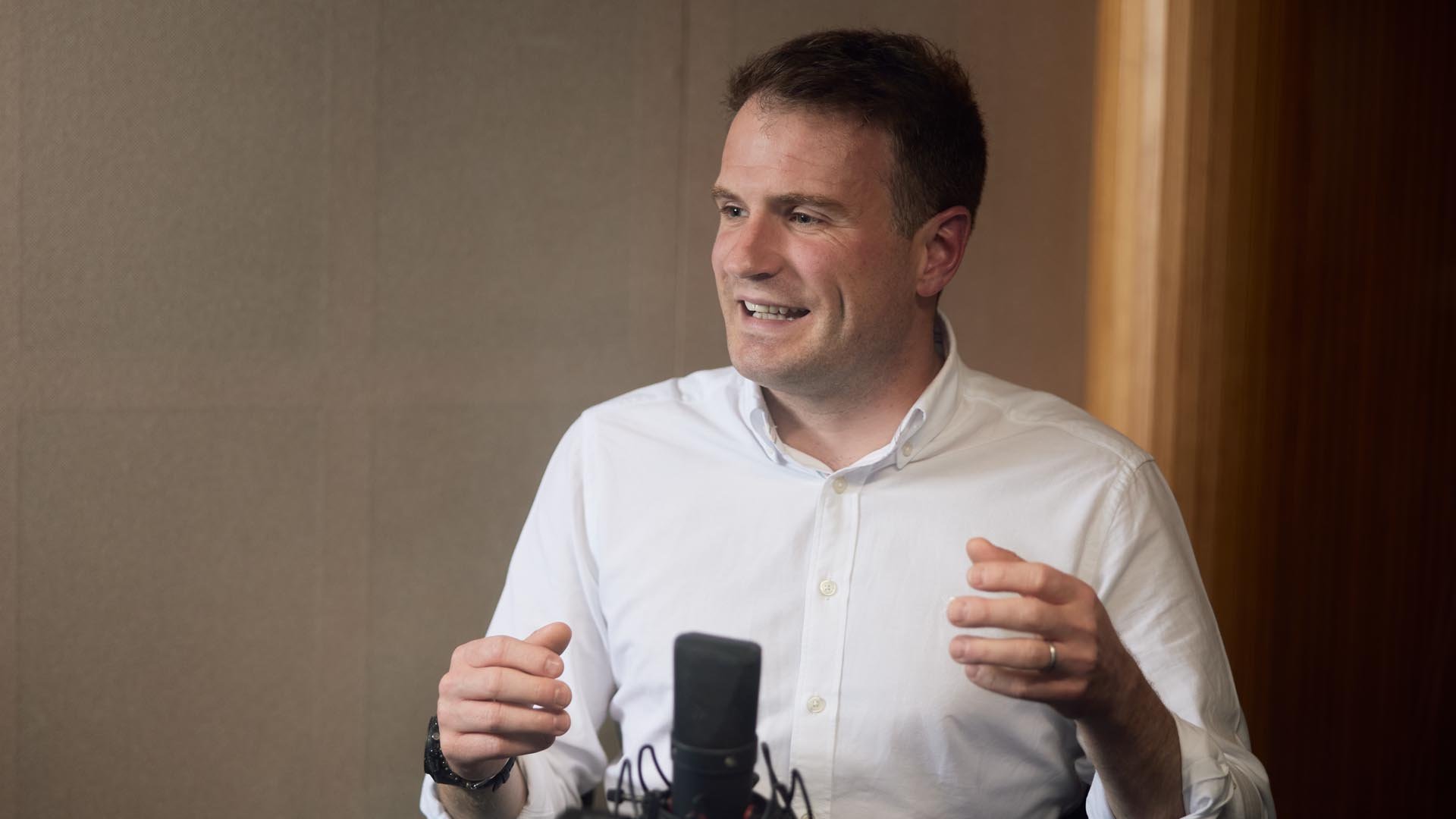
Illustrations by The Balbusso Twins
Please remember that the value of an investment can fall and you may not get back the amount invested. This article originally featured in Baillie Gifford’s Autumn 2023 issue of Trust magazine.
Big wave surfers live for this moment: faced with a wall of water, they ride the elemental force as fast as their skill allows. These monsters can occur when swells travelling across the ocean in the same direction but at different speeds coincide.
Surfers call the giant waves ‘bombs’ in recognition of their power and momentum.
They have parallels in our world. As an investment trust, we can act as a feeder wave, boosting a company’s growth by providing capital and other support.
But just as winds blowing towards land can cause large waves to collapse, we must avoid acting against our holdings’ long-term interests.
Robot-made salads
Take our investment in Sweetgreen. The US Growth Trust bought a stake in the salad-serving restaurant chain just over a year ago alongside other Baillie Gifford funds. We now rank among its top four external shareholders.
The Trust’s reputation for patience and focus on long-term growth meant Sweetgreen’s management knew we would support its robot experiments, which began in May.

The firm has installed an automated assembly line it calls an Infinite Kitchen at one of its Chicago stores. The machines assemble dozens of ingredients into different combinations, with human staff adding finishing touches when required. The company plans further tests elsewhere.
As with all our holdings, we encourage Sweetgreen to avoid spending for its own sake. But we support the company investing in potentially game-changing innovation even if it might take five or more years to pay off.
A supportive shareholder
Other ways we provide impetus can be more subtle. For instance, the biotech specialist Ginkgo Bioworks asked us for feedback when preparing its first sustainability report. We advised it to avoid skirting over areas lacking numerical data and to provide descriptive observations instead.
The effects of this kind of engagement are hard to measure, but they provide supportive ripples. Contrastingly, tugging a company in a different direction is likely to be counterproductive.
For example, imagine being a large ExxonMobil shareholder and using your influence to pressure it to slash oil production and prioritise renewables. I suspect you would distract the firm’s leadership and slow decision-making but not change the company’s direction.
The world is likely to need fossil fuels for a long while yet. In the meantime, I believe finding growth from the energy transition is more achievable by investing in stocks such as the electric car and truck makers Tesla and Rivian, whose mission is built on the switchover.
Private companies
One sector where the Trust has most impact is the private markets. The unlisted companies we invest in are typically yet to become profitable, so directly providing them with your capital enables them to fulfil their potential.
Discord is one example. The company runs an alternative social media platform designed around private spaces known as servers in which users share a common interest. It initially focused on video gamers, providing a way for them to chat via text, voice and video. However, other communities have since adopted it, ranging from stand-up comedy fans to artificial intelligence developers.
In 2021, the Trust participated in a $500m funding round. That gave the firm the flexibility to develop new features to widen its appeal. They include giving content creators a way to charge for subscriptions within its app, introducing an automated moderation tool and letting parents monitor whom their children are talking to.
These features make the product more valuable to its users and ultimately allow them to build more communities and services on it.
Solugen presents an even more straightforward case. The firm uses bio-engineered enzymes to make chemicals in such a way that it removes carbon from the air.
The Trust first invested in the Houston, Texas-based company two years ago and again in 2022. This provided it with funds to expand production. Without such capital, Solugen couldn’t physically make its products. In this case, there would be no wave without our involvement and that of other investors.
New waves
Our job isn’t just to think about how we feed into existing waves but to keep an eye out for new ones. Occasionally, an invention or trend emerges that generates a powerful surge, creating new business opportunities and the possibility of accelerated growth.
The introduction of personal computers and international trade resulting from globalisation are past examples. When such forces arise, we must ask whether the resulting currents will propel our portfolio companies forward or drag them down.

‘Generative’ artificial intelligence (AI) has the potential to be one of the major drivers of this era. And Duolingo is an example of an early adopter turning the innovation to its advantage.
In March, the education app added Open AI’s GPT-4 technology to let subscribers practise their foreign language skills with an interactive chatbot and get constructive feedback about their mistakes.
And that was just the start. Chief executive Luis von Ahn used to think it would take a further 10 to 15 years for his app to become as good as a human tutor. He now believes generative AI could bring that forward to 2027.
Physical and digital
The rise of companies mastering ‘atoms and bits’ represents another new wave.
Historically, firms specialised in atom-based physical goods and services, like chemicals and air travel. In the 20th century, others rose to prominence by specialising in bit-based digital services, such as Google’s search engine and Meta’s Facebook social network. However, an increasing number are adeptly blending software with capital-intensive physical infrastructure.
Amazon led the way. Its online stores combine sophisticated data analytics with massive, robot-assisted warehouses, while its AWS cloud services rely on cutting-edge software and intricate facilities housing countless computer servers.
The drone delivery service Zipline and vaccine developer Moderna stand out as other companies successfully merging the physical and digital domains.
Greater collaboration
What’s invigorating is that I believe big wave-style growth will become more common. Companies that behave more like collaborative ecosystems than forts obsessed with defence are emerging.
These new businesses share and improve tools developed under open-source licences or provide services to each other for a fee, such as the previously mentioned GPT-4.
Twilio’s customer engagement products are another example from a portfolio company. This type of cooperation makes them nimbler and more flexible than if they tried to develop all their critical know-how in-house.
Surfers have a name for it when several mighty waves come in one after the other: a bomb set. We’re committed to helping the companies we back to replicate the phenomenon and will continue to scan the horizon for others in the making.
At the time of publication, in addition to the Baillie Gifford US Growth Trust, the following trusts were invested in the companies mentioned above:
Amazon – Monks, Scottish Mortgage
Duolingo – Keystone Positive Change
Ginkgo Bioworks – Scottish Mortgage
Meta – Monks
Moderna – Keystone Positive Change, Monks, Scottish Mortgage
Solugen – Scottish Mortgage
Tesla – Keystone Positive Change, Monks, Scottish Mortgage
Zipline – Scottish Mortgage
Important information
Baillie Gifford US Growth Trust has a significant investment in private companies. The Trust’s risk could be increased as these assets may be more difficult to sell, so changes in their prices may be greater.
The Trust’s exposure to a single market and currency could increase risk. Investments with exposure to overseas securities can be affected by changing stock market conditions and currency exchange rates.
The views expressed in this article should not be considered as advice or a recommendation to buy, sell or hold a particular investment. The article contains information and opinion on investments that does not constitute independent investment research, and is therefore not subject to the protections afforded to independent research.
Some of the views expressed are not necessarily those of Baillie Gifford. Investment markets and conditions can change rapidly, therefore the views expressed should not be taken as statements of fact nor should reliance be placed on them when making investment decisions.
Baillie Gifford & Co Limited is wholly owned by Baillie Gifford & Co. Both companies are authorised and regulated by the Financial Conduct Authority and are based at: Calton Square, 1 Greenside Row, Edinburgh EH1 3AN.
The investment trusts managed by Baillie Gifford & Co Limited are listed on the London Stock Exchange and are not authorised or regulated by the Financial Conduct Authority.
A Key Information Document is available by visiting bailliegifford.com
58717 10035840





